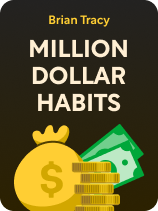

This article is an excerpt from the Shortform book guide to "Million Dollar Habits" by Brian Tracy. Shortform has the world's best summaries and analyses of books you should be reading.
Like this article? Sign up for a free trial here.
Do you want to improve your physical health? What types of food should you avoid for a healthy life?
Keeping your body in optimal physical health is another aspect of personal success and well-being. The sooner you start building healthy habits, the better off you’ll be.
Take a look at three of Brian Tracy’s tips for physical health.
Tip #1: Avoid Salt, Sugar, and White Flour
Tracy’s first tip for physical health is to eliminate salt, sugar, and white flour from your diet as much as possible.
- Excess salt causes water retention, bloating, and potentially high blood pressure.
- Sugar spikes your blood glucose and insulin levels, leading to energy crashes.
- White flour is difficult to digest and lacks nutrients.
Avoiding these ingredients stabilizes your energy, helps to prevent diseases, and promotes healthy digestion. Swap processed snacks for fruits, vegetables, nuts, and whole grains to get the nutrients your body needs without the drawbacks.
(Shortform note: A diet rich in whole foods and low on processed salt, sugar, and flour isn’t just good for your metabolism—it’s also advantageous for your oral health. In Jaws, orthodontist Sandra Kahn and biologist Paul R. Ehrlich explain that ancient humans actually had healthier mouths than modern humans do. The authors say this is because ancient humans used their teeth for rigorous tasks like tearing raw meat and grinding up uncooked vegetables. This intensive use led to the development of larger jaws and stronger teeth, which naturally protected them from many of the dental issues we face today, such as malocclusion and tooth decay. Conversely, our modern diets of soft, processed foods leave us with underdeveloped jaws and weak teeth.)
Tip #2: Get Enough Sleep
According to Tracy, you need seven to eight hours of sleep nightly for optimal cognitive and physical health. Adequate sleep makes you more productive and happier by keeping your mind clear and your body strong. When you go to sleep around 10 p.m. and wake up around 6 a.m., you also have time for relaxing morning habits like meditation and reading.
(Shortform note: One suggestion to fall asleep and stay asleep more effectively is to keep your bedroom quiet, dark, at a comfortable temperature, and free from electronic devices that keep you awake such as computers or smartphones. Experts also recommend avoiding caffeine and alcohol use close to bedtime—both chemicals disrupt your sleep cycles and are likely to prevent you from getting restful sleep. They also say you shouldn’t eat large meals late at night, as doing so can cause digestive discomfort that interferes with your sleep.)
Tip #3: Exercise Regularly
Finally, Tracy states that no list of healthy habits is complete without regular exercise—ideally at least 200 minutes weekly.
Exercise keeps your muscles and joints healthy while reducing pain and improving balance and mobility. You’ll also feel more energetic in your daily life when you stick to an exercise practice. For optimal health benefits, focus in particular on aerobic activities that exercise your heart and lungs as well as your muscles.
| Start Exercising Now to Stay Healthier Longer The benefits of regular exercise are numerous and well-documented, but one of the more surprising benefits is that, to some extent, exercise directly counters the effects of aging. Furthermore, the anti-aging effects of aerobic exercise continue to work no matter how old you are. With that said, seniors may find it difficult to exercise regularly without injuring themselves, thereby doing more harm than good. To help avoid that problem, there are many exercise programs geared toward older adults, such as aquatic yoga classes. To highlight how effectively exercise slows the aging process, studies have found that doing moderately intense exercise for 300-600 minutes per week reduces the risk of death at any particular age by about a third. In simpler terms, the more you exercise—and the sooner you start—the longer you’ll live. |

———End of Preview———
Like what you just read? Read the rest of the world's best book summary and analysis of Brian Tracy's "Million Dollar Habits" at Shortform.
Here's what you'll find in our full Million Dollar Habits summary:
- How to achieve financial independence and a rewarding career
- The power of positive thinking in your personal and professional lives
- How avoiding salt, sugar, and white flour promotes a successful life






